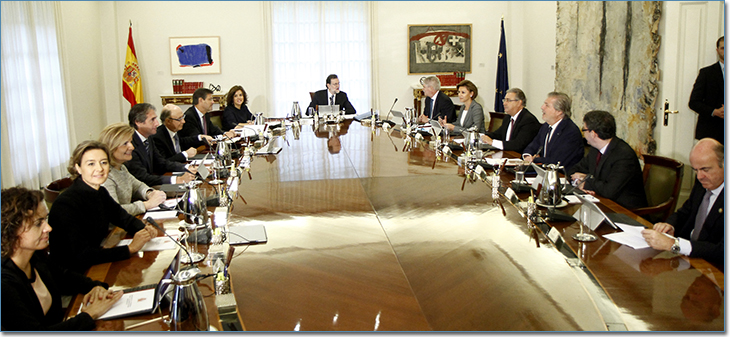Council of Ministers
Government raises minimum wage by 4% and increases benefits to people in long-term care
Council of Ministers - 2017.12.29
Moncloa Palaca, Madrid
The Government approved a Royal Decree setting the amount of the minimum wage (Spanish acronym: SMI) for 2018 in the sum of 735.90 euros per month, with 14 payments, to amount to a total of 10,302.60 per annum.
This increase for next year comes as a result of the Social Agreement on the Minimum Wage 2018-2020, signed on 26 December, between the government, the General Secretaries of the trade unions CCOO and UGT, and the Presidents of the employers' associations CEOE and CEPYME.
This new legislation also regulated the minimum wage for temporary workers that work for a company for less than 120 days, set at 34.85 euros per working day. Furthermore, for domestic workers that work for an hourly wage on an external basis, the minimum wage will stand at 5.76 euros per hour worked.
Increase in aid for long-term care
The Council of Ministers approved a Royal Decree establishing the minimum level of protection for beneficiaries of the System for Autonomy and Protection for Long-term Care.
Central Government will contribute 1.35 billion euros per annum for those autonomous regions that improve long-term care and reduce waiting lists, representing a 5.26% increase. This seeks to recover part of the benefits lost by this group during the economic crisis.
Pension rise
The government approved a Royal Decree establishing the public pension rise under the social security system and for retired civil servants for 2018, under which pensions and economic benefits will rise by 0.25%.
The social security system forecasts show that this increase will affect 9,584,189 contributory pensions, 454,960 non-contributory pensions and 194,874 family benefits.
Science, technology and innovation
The Council of Ministers approved the State Scientific and Technical Policy and Innovation Plan for the period 2017-2020. This State Plan constitutes, together with the State Plan for the period 2013-2016, Central Government's main instrument to develop and achieve the goals of the Spanish Science, Technology and Innovation Strategy 2013-2020 and the Europe 2020 Strategy, and includes the State subsidies allocated to R&D+i.
The President of the Government, Mariano Rajoy, highlighted, when taking stock of the year, that the measure approved on Friday "seeks to strengthen and improve R&D+i activities and instruments in all areas". In his opinion, "boosting these activities lies at the very foundation of growth and the creation of quality jobs in the long term".
Rental of vehicles with driver
The government approved a Royal Decree establishing supplementary rules to those already in force in relation to the operation of permits for the rental of vehicles with a driver (Spanish acronym: VTC), with the aim of avoiding speculative practices.
In this regard, those who have applied for a VTC licence, without intending to operate such activities, but with the sole aim of financially benefitting from their immediate re-sale, may no longer carry out this practice. To ensure this is complied with, the transfer of permits for a temporary period of two years from the date on which they are originally granted is prohibited. Furthermore, VTC services must be notified to a new State register before being carried out.
These measures will improve the regulation of the VTC sector and will facilitate their orderly operation alongside the taxi sector.
Social economy
The Council of Ministers approved the first National Social Economy Strategy 2017-2020, designed around 11 pillars with the aim of consolidating and promoting a business model for the social economy so that the sector can head up innovation to tackle emerging changes.
The strategy contains 65 measures to boost the sector and prioritises the creation of inclusive, stable and quality jobs with measures that promote group entrepreneurship.
Tax measures
The Council of Ministers approved a Royal Decree-Law to extend and approve various tax measures and other urgent measures on social issues, which provides for the coefficients to update cadastral values for 2018.
The new legislation also maintains the limits that establish the method of objective Personal Income Tax estimates for 2018, as well as the objectives estimates for the Simplified Special Regime and the Special Regime for Agriculture, Livestock and Fisheries for VAT.
Financial markets
The Council of Ministers approved a Royal Decree on measures to transpose the European Directive on Markets in Financial Instruments, known as MiFID II, in relation to trading venues, into Spanish law.
This decision will lead to the harmonisation of financial markets in Spain with international standards, thus improving such aspects as market transparency, efficiency and stability.
Direct and indirect taxation
The government also approved a Royal Decree modifying the regulations on three direct taxes: the Regulation on Personal Income Tax (Spanish acronym: IRPF), the Regulation on Corporate Income Tax and the Regulation on Inheritance and Gift Tax.
The aim of this measure is to adapt the regulatory texts in force to current legislation, clarify the content of several rules and introduce certain amendments aimed at simplifying their administration, whilst reducing administrative burdens.
The Council of Ministers also approved a Royal Decree that modifies the regulations on certain indirect taxes, principally on VAT, Transfer Tax and Stamp Duty, and Special Taxes.
Application of Article 155 of the Constitution
The Council of Ministers held another meeting called pursuant to the agreement adopted at the Plenary Session on the Upper House of Parliament on 27 October 2017, approving the measures requested by the government under the scope of Article 155 of the Spanish Constitution.
The agreements adopted include the subscription by the Autonomous Region of Catalonia to the collaboration agreement signed between Central Government and the National Business Association of the Pharmaceutical Industry (Farmaindustria) on 29 December 2016.
Non official translation





